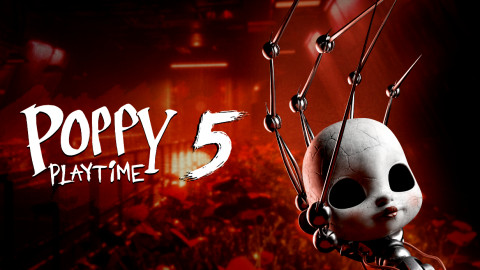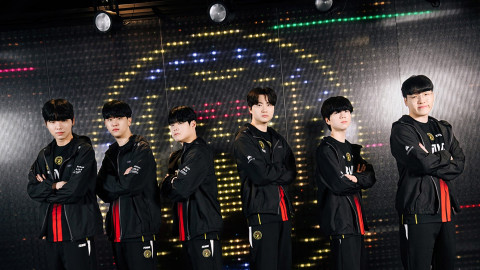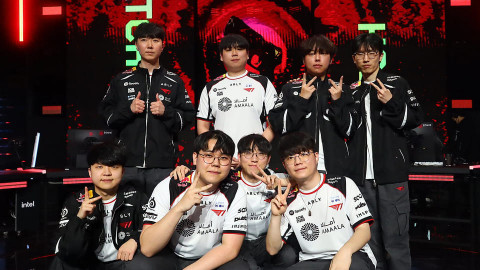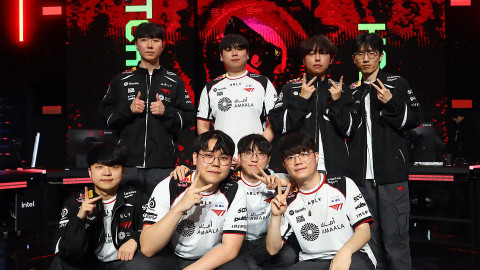
"We never said it was going to be easy, but it was going to be beautiful."
This was what lingered in my mind well after the interview with Romain "Khagneur" Bigeard. Well-known as the team mascot of the Unicorns of Love, a popular EU team beloved by many fans worldwide, Khagneur was a fun-loving and energetic person, whose passionate spirit influenced those around him. When I heard that UoL was in Korea to bootcamp for the upcoming Summer Split, I seized the opportunity to meet him in person, and enjoyed every moment of our meeting. I was able to witness his passion seeping through when he scribbled on papers to help us understand better as he shared his insights on the UoL team, bootcamping in Korea, scouting new players in Europe, female gamers, and the LCS Summer Split.
The first thing that caught my eye the moment I walked into the room was the unicorn hat on top of Khagneur's head, which he wore throughout the whole interview, and it was a warm day. He seemed like a playful person, just like he was seen as on the stage, although not barechested- to my slight disappointment, he was wearing his pink UoL team shirt. We introduced ourselves to Khagneur, and sat down to begin the interview.
As Khagneur was well-known for being the team mascot, we'd already seen the fun side of him in LCS. But there were many Korean fans who didn't really know what he actually did in UoL besides dressing up as a unicorn, so our first question was, what was it that he did in UoL?

Upon hearing our question, Khagneur asked for paper and a pen, and started to scribble on it as he explained how it was for him when he first joined the team. He had absolutely no clue on what to do when he joined, so he had to "invent his own job" and come up with what to do. It took about a year and half for him to be able to answer such questions. He said, there were four main things he had to do in the team, including managing sponsors, logistics, administrative duties, and of course, being the team mascot. The importance ran from highest to lowest, and these were connected to every part of the team life, which he wanted to be and chose to be part of in UoL. It seemed that what he did in UoL wasn't really different from what managers for other teams did, except one very special part- being team mascot.
Khagneur has been active on the stage as the team mascot with his flashy unicorn attire, which imprinted powerful impression on many fan's hearts. We asked him if there was any special reason for being the team’s mascot, and Khagneur told us it was the fun and energy that drives him to enjoy being the team mascot - as well as the "shame training" for his team. He believed that one should always do something that one loves doing, and he loved dressing up as the team mascot. The fun of being on the stage as the team mascot gave him the energy; He loved being in front of the crowd and hyping them, especially when people shout after him- "Say-yo!" "Hey-yo!" "That was cool, again!" He regarded this as a sort of shame training for his team: If he were to gather the courage to stand half naked on the stage in front of the crowd in his unicorn costume, then his players will also be able to gather courage on the stage and become immune to any possible embarrassment. He said, “It's like leading the pack. I will take everything for the team." - A true, dedicated manager.
And as if his dedication had effect, UoL has shown improvement in their performance for the Spring Split, compared to their previous games. What was it that UoL had prepared in priority to make this happen?
Khagneur answered that it was about continuing to gain experience together as a team, since players who are experienced as a team are able to perform better than a team of rookies who don't know each other well. Khagneur, Sheepy, Vizicsacsi and Hylissang had 2 years of experience together as a team; Exileh also had a bit of experience with them as well. Then, there were the two rookies, Xerxe and Samux, and it became the team’s priority to integrate them into the team.
Khagneur explained, “Our aim is to play over and over so that they go through all kinds of situations in various perspectives. There are endless possibilities of how a game could run and end. It could be a 20-minutes short game, or it could be a 45-minutes long game, but there's no guarantee that they will have either of these games on the stage; they have to improvise now and then. To be able to do that efficiently, they need to play as many games as possible with the same five people.”
"Once everyone knows what to do by heart, you know them so well that it’s like playing basketball or rugby; at some point, you throw the ball, and you know your friend is going to be there to receive it. But if you play with a stranger, you’ll have to look at him, give him the ball, he looks at you, and then you get the ball. But if you play together again and again, I just throw the ball without looking, and I know that person is going to be there. So that’s why we train - to know what we can do by heart, so we don’t even have to speak to each other about it anymore." He seemed satisfied with the good teamwork gained through hard work of practice and experience as a team. Then, was he satisfied with UoL's performance or result in the Spring Split?
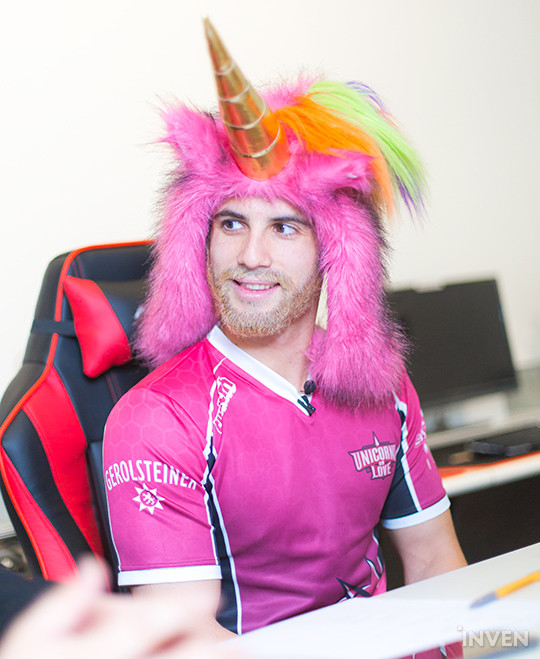
"Extremely." was his answer.
When UoL played in IEM, they kept winning until they face Flash Wolves and G2 - they were the first defeats that the team experienced. However, Khagneur explained that these defeats were actually a good case for them to learn to become a better team of five. When they played in 2017 EU LCS Spring Split, they were on a winning streak until they lost against G2 Esports in the finals. Overall, they defeated everyone except G2, and since they had 2 new members on the team, he considered this as a good split - especially for the two.
Did these newcomers, Xerxe and Samux, improve as they continued to play with other old teammates and learned from their experience? We asked Khagneur whether these two were growing enough to match his expectations.
“Definitely.” He said, “It's easier to integrate two new people into the team since other old members already knew how to work well with each other in stability.” He believed this to be the optimal, ideal way to have roster changes - one player, maybe two maximum, can benefit from such structure.
"It’s like if you have a body, you have a really solid backbone, and you are just changing one arm or one leg. The rest of the body can “teach” the new limbs. If you change two arms and two legs at once, it’s going to take a longer time than learning how to evolve, you know."
He was satisfied with the two rookies who have been doing a great job of integrating with the veterans. Also, to be fair, Xerxe and Samux weren't really rookies - they were actually experienced players that needed time to adjust.
We then asked him which match in this split did he find most satisfying and disappointing. He said he had one specific game he really liked, but as for the disappointing games, he'd just forget about them, which puzzled us at first. He said he only like games that went well, because he believed that they should work even harder when winning by taking time to analyze why they have won whenever they win.
"If you win, you need to know why you won. You need to know why you had a good game, and what you did to win that very game. Why? Because you are going to lose at some point. Everyone loses, even SKT T1. On the day you lose, what do you do? You take the list you wrote before, and go over it to remind yourself how you won doing what. Then you can go to work and remember how to win again. And I think this is really important. That’s why I don’t care about loss; I only care about win because winning gives you the right recipe. And you have to understand it so that on the day you lose, you can go back to this recipe and win again."
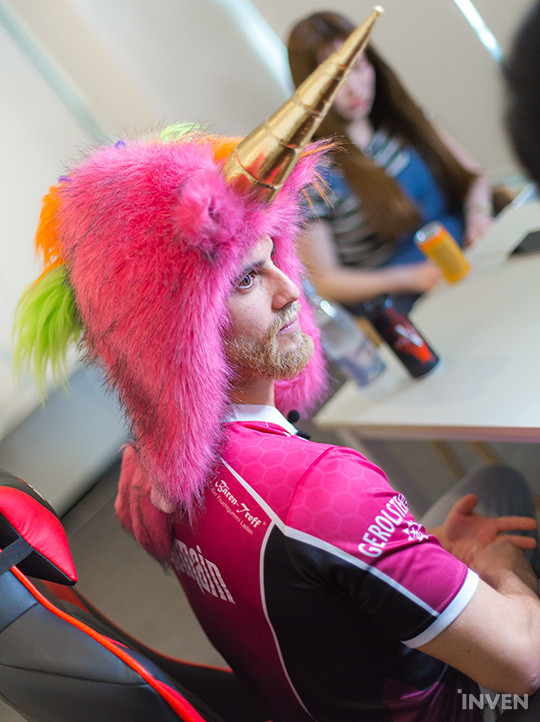
Then he shared his favorite match of the split with us. It was the match against Flash Wolves in the Finals for IEM Season XI - Oakland, and he told us that it was an example of a particular recipe: fun.
"We had this game in IEM Oakland, where we defeated Flash Wolves in the fifth game. We are going 2-2. It’s the finals, IEM had lots of delays, so the game, the full series was like 5 hours, I think? So it was a nightmare. Everyone was tired, and they were like, “I don’t want to play anymore!” and we had to go back to the stage. I remember Veritas is lying on the ground, saying: 'I don’t want to play anymore!' When we went back to the stage, Veritas and Hylissang looked at each other and said they were going to play Thresh-Kalista, but, at the time, nobody played Thresh-Kalista anymore because they were nerfed. Still, they looked at each other and agreed to play Thresh-Kalista, and then looked around and looked at the rest of the team, who were like, ‘We trust you.’
To me, that was amazing. Everyone was tired, everyone was exhausted, and what do you have left when you are tired and exhausted? Friendship. They were just friends, and they wanted to have fun. You know these games, you play them at 4 o’clock in the morning when you should be in bed, and you go like, “Ok, one more game” even when you know you are going to lose it. You should stop and go to bed, but you play anyway without any pressure. Then, we won. We won the IEM. It was amazing. What I learned from that game was a recipe for winning, that says: “You should have fun.” This could actually be my main point. If you don’t have fun, you cannot win. I still need to find other recipes, but for that, we need to win more."
There are several recipes for winning, and according to Khagneur, fun was definitely one of them. I was quite amazed when I heard this - the usual recipe I've heard would be analyzing losses, including identifying the mistakes made in a game and going over those mistake. That's what the Korean teams, especially SKT T1, do best to win. We naturally became curious, and asked Khagneur his take on that.
Khagneur, rather surprisingly, agreed that it was good; but told us that it wasn’t going to work for them.
"It’s perfect - it’s really good. They need to find someone responsible for the mistake, and they need to correct it. However, I think it’s really hard to work like this in Europe because we have a lot of ego. Is this good or bad? I don’t know; it’s just a fact. I think if you work with European people, it’s easier to push everyone towards winning more than correcting mistakes. This is one of the reason why I think Kkoma is an amazing coach to Korean players, but if he were to coach European players like that, they’d all die. They’ll be like, 'Kkoma is crazy, I’m out.' I’d be really interested to see 5 European players get coached by Kkoma and see what happens. One of the reason Korea is so strong is because they actually face their problems, point them out, and they improve and get better."
Khagneur continued. "There’s no book for training someone. I believe that Kkoma is really smart, and he adapts to each player differently. Although I talked about recipes, I believe there’s no such thing as an exact recipe; there are just general ideas and improvisations from the coach. That’s why I’m all about having fun. If you don’t have fun, you cannot be a pro player. The coach, however, has to be really smart. That’s why Kkoma is the best - he’s smart with people. That’s important. You’re training people, not robots. Faker is a human, not a robot."
We all burst in laughter at how hard it was to believe. The idea of Faker being a human! But he had a point there - there was no exact answer to how a coach should train his players, especially when every player is different.

Then we moved on to their bootcamping in Korea. What was the reason they came to Korea to train, and were they satisfied with overall training or the environment? For that one, they were certainly happy with it.
“We love it! We have a really nice boot camp which NVIDIA provided us, and then we met amazing people on site. Solo queue is amazing, the ping is great, the internet is nice, and the food is really nice. Few weeks so far, it’s been really nice. So yes!”
Besides the environment, what kind of training was UoL doing, and how did he feel about it?
“Right now, it’s all about the new patch. Last time we played a competitive game was before Galio patch. So we had a lot to discover. There are a lot of new stuff. Champions such as Maokai and Galio have changed a lot. It’s about how you integrate old champions into new metas and how you analyze the new metas. We have a lot to learn right now, and it’s going to take another 2 weeks, I believe. We’re trying our best. Although we can’t say that we have a technique yet, we’re definitely trying stuff.”
Now that Khagneur mentioned newly changed champions, we brought up how UoL was known for playing champions with unusual composition. We remembered how Xerxe played Warwick once, but was there any uneasiness or anxiety over playing uncommon champions in the tournament for Unicorns of Love?
Khagneur disagreed, and it actually turned out to be the opposite- they loved it! They saw the strength of new meta picks, especially when playing champions that other players are reluctant to play and have no clue on how to react against when on the same lane. This was the first advantage they aimed for; the second advantage was provoking the opponent laner. “He’s playing Yorick, he’s disrespecting me!” Khagneur laughed. “It’s perfect, you’ll probably win.”

The interview was going well with everyone getting warmed up nicely, so we moved on to ask Khagneur about the article he posted on Reddit 3 months ago about importing Korean pro gamers to EU, and advice for those who dream of becoming a pro gamer in Europe. Not only fans in Europe were touched, but also many fans in Korea were stirred by it. What motivated him to write it?
“I think the initial trigger for the reflection was Veritas leaving, and us having to get new rookies. Regarding the reason Veritas left, many people online said he wanted to go to CJ Entus, which was why he betrayed us, but that’s not true at all. The reason he left was because he was sad, and he was sad because he was homesick. I was actually surprised by how he felt, because I mean, we had H0R0 and Move but they weren’t homesick, but Veritas was. I thought a lot about it, and I realized that Korea is so different from Europe. I can understand why he is homesick. This was actually why having to import Korean pro gamers to European teams was hard.”
We listened intently as Khagneur went on explaining further on the topic. The first reason was that it was hard to sell a non-local player to European sponsors, and the second one was adaptation. It was difficult for a non-English speaker to adapt and get integrated into the new life in EU. Even Veritas found it hard, and he could speak English. The food was different, the places were different- everything was just different. It wasn’t about being Korean, but it was more about coming from a totally different culture and environment that you were used to, not to mention the language/communication difficulties.
“A lot of people called me racist, but they totally didn’t understand what I meant. It’s not about where you are from, whether you’re from Korea, China, India, or Spain, but it’s about the cultural difference. Then why are we keep hiring Korean players? Because they are the best, like literally.”
Khagneur continued to explain the reason in an impassioned manner: Koreans were best because Korea had 10 years of expertise in esports, starting from Starcraft, Starcraft 2, League of Legends, Hearthstone, Overwatch, and many other games. They knew how to recruit their players, train and look after them. Koreans knew how to create Korean pro gamers, ready to play in Korean pro teams.
“But what about Europe?” He asked. “Where are all the European pro gamers? They are trying to make an European team, but where do they find the right players? It won’t work in the same way in Europe.” he continued. “If you go to the top ladder on Korean server, it is full of talents ready to play in pro teams right away. However, if you go to the top ladder on European server, most of them are toxic kids who are not ready yet.” They did not know how to train them and turn them into pro gamers, so they needed answers to these from Korean pro gamers. Khagneur pointed out the importance of having their own European players.
“For every 10 Koreans that are to come to Europe, maybe two or three will turn nice, like the guy from G2, or people from Cloud9, even Huni. But look at Huni - Huni went to play in Europe and NA, but in his heart, he's Korean so he wants to play for a Korean team. So when SKT called him back, he went straight back to Korea. I would do the same. If I’m French and goes to play for SKT and I win, and at one point the best French team calls me, I’d go since I want to play in front of my own people. It makes sense. My main point was to convince these people to turn into PGM so we can actually have our own European PGM.”
Since he emphasized the importance of raising European players, we asked him if he could share with us what is it that they actually do to raise European players.
“We would need more money for that. We are too small at the moment, but I think by having full European roster that performs well, we’ll be leading the way. Fnatic, Splyce, H2K are also full or almost full European teams that are leading as well. We have enough people. European server is just as big as the Korean server. From pure statistics perspective, why don’t we have same amount of pro players?
We cannot do anything about European server right now, but we are focusing on Europe for us. If we have to change a player tomorrow, I’d definitely pick an European player as a replacement. Though, scouting is a problem in Europe right now. When I wrote about on Reddit, I should have added a question about scouting: “How do you identify a good new player?” I’d love to ask Kkoma about it, so that we can find new good players.”

This wasn’t the only question he asked; he brought up another issue that I’ve been meaning to ask for a long time - Where are the female players? Why aren’t there any female pro players playing with other existing pro players together in the league?
“Where are the girls? That is my question. That is something I do not understand. I would understand if it was rugby or football, where you have different leagues for boys and girls because these sports are based on muscles. But League of Legends is based on brain and reflex. I do not believe that girls are below boys in that aspect. Why aren’t there any girl pro gamers? There are a lot of girls playing video games. I have a dream which is having tournaments with girls and boys both playing in it. Having only girl tournaments is ridiculous. Girls and boys are the same. I’d like to have teams made of girls and boys together. You do not have that in any other sports. What about esports being the first one to have girls and boys play together? Since Korea is so advanced compared to Europe in scouting and training that Korea may be able to do that.”
“There must be girl players. I don’t think the league is consisted of 90% of boys and 10 % of girls, it must be 70% boys and 30% girls. So for each 7 Fakers, there must be 3 ‘Fakerina’s (Everyone in the room bursted with laughter at this. Fakerinas!). I don’t know how else to say it, but where are they? We need girl gamers, they need to step out! Girls, wake up!”
Khagneur added, “Because from business perspective, you can sell to the media that esports is open-minded game where boys and girls can play together. That would be something really new and beneficial for esports.”
Then what about the team house problem? Will he be putting girls and boys together in the same house? To this question, Khagneur answered, “If you have good management, it’s not a problem. In every joke, you have a bit of truth, which is why it becomes a concern. So if you have good management, no problem. Give the girl to Kkoma to train!”
Since they were in Korea to prepare for the upcoming LCS Summer Split, we asked him how UoL is preparing, or what their main goal was.
“Beat G2. That’s all we need. G2 lost one series in Europe in 400 days versus Roccat, which was a weird game. But Roccat totally deserved to win. They found a way to tilt G2. That’s it. G2 lost one series. They won everything else. We need to beat G2. How do you expect us to win against Korea and Flash Wolves, if we can't even beat G2? It’s simple. So that’s the main goal for us - beat G2!”
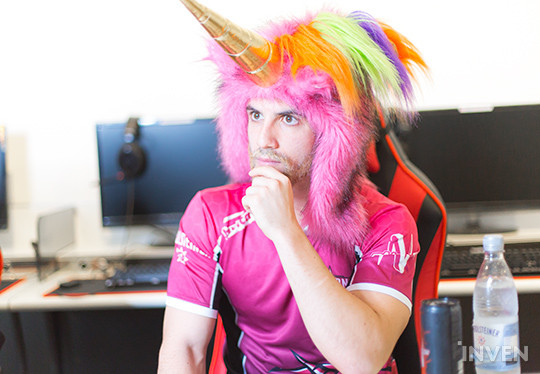
Seeing the determination in his eyes, I was able to believe that it could indeed become true as Unicorns of Love was a team with endless potentials.
Regardless of how much we enjoyed talking with Khagneur, the end of this interview was nearing- we had come to our last question. What was their motto/slogan for the upcoming Summer Split, we asked.
“Beat G2!” We all laughed. Khagneur closed the interview with more significant answer.
“It’s a life motto as well- we never said it was going to be easy, but it was going to be beautiful, which means work! Try hard. So if you want ‘beautiful’, and to me ‘beautiful’ is being on the stage in front of people, and beating G2, which is not easy. So we must try hard to get that “beautiful” in the end.”
Sort by:
Comments :0


